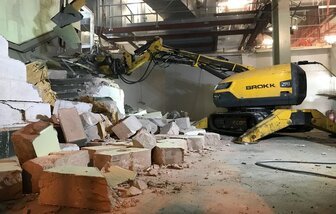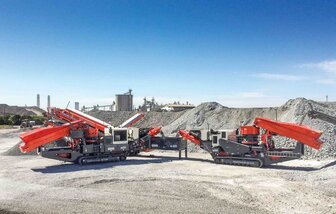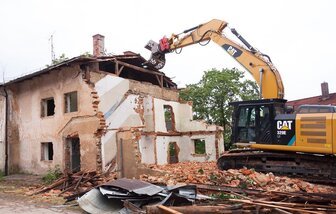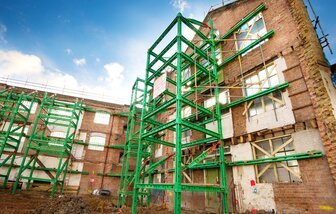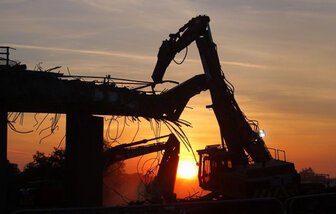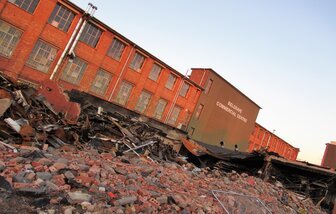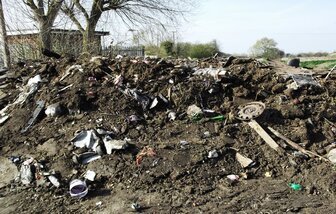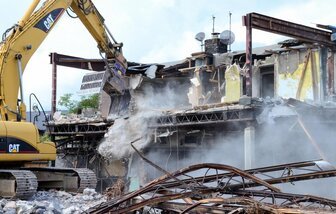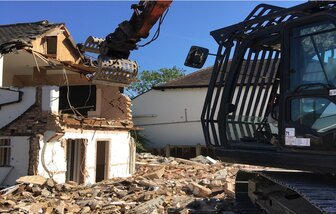Complete Demolition Services Contractors in Halifax
Complete Demolition is a leading demolition, enabling works, and asbestos removal contractor in Halifax with over 40 years of experience. We offer a range of services including full and partial demolition, interior demolition, and site clearance. Specializing in urban and infrastructure regeneration, we transform outdated structures into community-beneficial spaces. Consider Complete Demolition for reliable, safe, and efficient demolition services tailored to your needs. Trust the experts with decades of experience to contribute to the growth and development of Halifax.
Complete Demolition Services & Enabling Works You Can Trust in Halifax
Complete Demolition has made a name for itself as one of the leading demolition companies in Halifax. Established in 2014, our firm has gained a reputation for quality, innovation, and adherence to health and safety regulations.
Our success stems from building strong, lasting relationships with clients across various sectors, including local authorities, health trusts, and utility companies.
Comprehensive Range of Services
At Complete Demolition, we offer a wide array of specialist services that cater to both national and international clients. From complete demolition and decommissioning to remediation and urban regeneration, our team of skilled professionals manages every aspect of the demolition process.
We also provide essential services including recycling, asbestos removal, waste disposal, and land reclamation, ensuring a bespoke solution for each project.
Commitment to Quality and Safety
With over 40 years of experience in the demolition industry, we prioritize client satisfaction through reliability and professionalism.
Our commitment to continual improvement encompasses safety, technical operations, and compliance with all pertinent regulations, ensuring each project is executed to the highest standards.
Trust Complete Demolition for all your demolition needs, and see how we contribute to the growth and development of Halifax.
Urban and Infrastructure Regeneration
In addition to traditional demolition, Complete Demolition specializes in urban and infrastructure regeneration. We understand the importance of revitalizing urban areas to enhance the quality of life and promote sustainable development. Our expertise in this area allows us to transform outdated or unsafe structures into spaces that benefit the community.
Demolition Services In
If your seeking a cost effective demolition contractors, we cater in the following areas, Aberford, Addingham, Baildon, Batley, Birkenshaw, Boston Spa, Brighouse, Calverley, Castleford, Cleckheaton, Cowling, Darrington, Elland, Featherstone, Haworth, Hebden Bridge, Heckmondwike, Hemsworth, Holmfirth, Honley, Kirkburton, Knottingley, Lepton, Liversedge, Marsden, Mirfield, Morley, Normanton, Oxenhope, Rothwell, Skelmanthorpe, Slaithwaite, South Elmsall, Sowerby Bridge, Thornton, Todmorden, Wetherby, Yeadon.
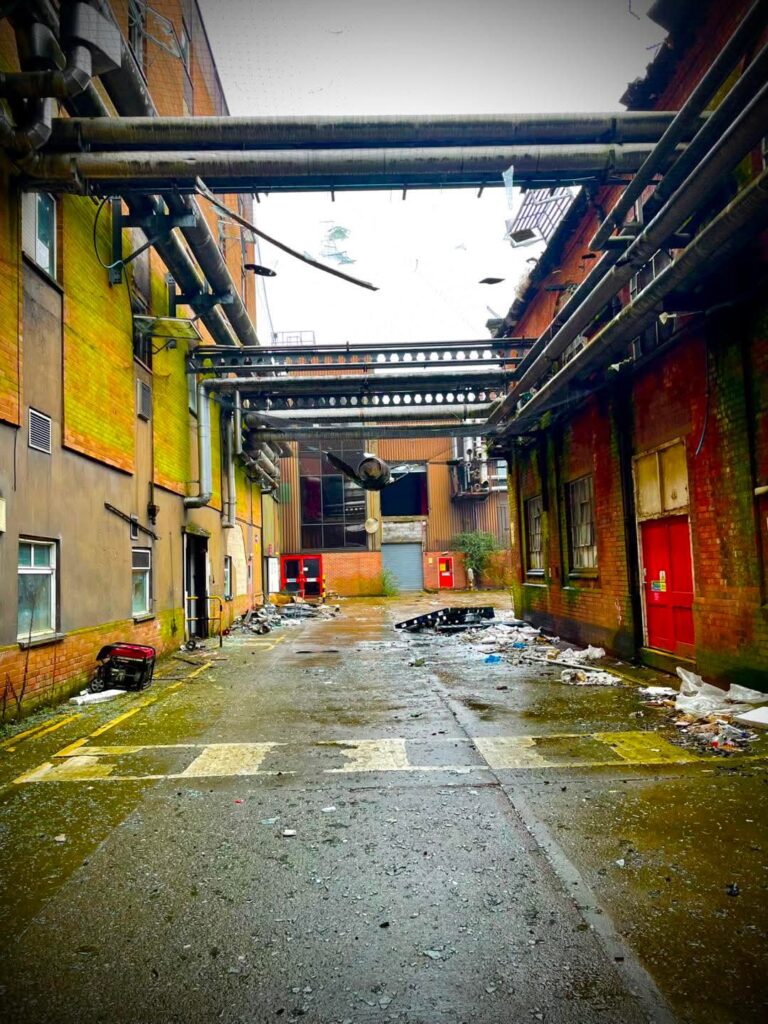
TOTAL Building demolition Halifax
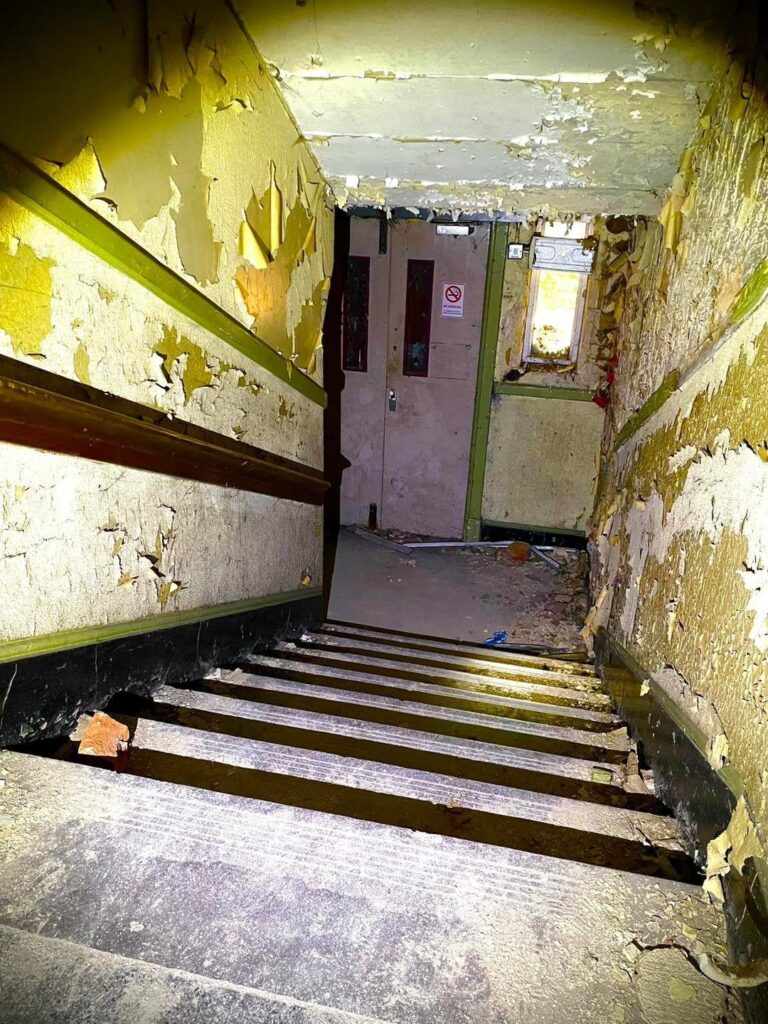
Comprehensive Building Demolition and Site Clearance Solutions in Halifax
At Complete Demolition, we pride ourselves on being the leading contractors for building demolition and site clearance solutions in Halifax.
Our team of experts is well-equipped to handle projects of any scale, ensuring that each task is completed with the highest level of professionalism and efficiency.
Comprehensive Building Demolition Services Halifax
Our demolition services are designed to cater to a wide range of needs. Whether you are looking to demolish a residential property, an industrial facility, or a commercial building,
Complete Demolition has the expertise and the equipment required to execute the job safely and effectively. We follow strict safety protocols and environmental guidelines to minimize the impact of our work on the surrounding area.
Efficient Site Clearance
In addition to our demolition services, we offer thorough site clearance solutions. This includes the removal of debris, hazardous materials, and any other obstructions that may be present on the site.
Our team ensures that the site is left clean and ready for the next phase of development. With our site clearance services, you can be confident that your project will proceed smoothly and on schedule.
TOTAL Urban & Infrastructure Regeneration Halifax
TOTAL Robotic demolition experts in Halifax
We are expert confined demolition contractors in Halifax with extensive experience in BROKK robotic demolition.
Site clearance is often an integrated part of construction and demolition projects. We deliver a comprehensive controlled demolition service in Halifax using remote-controlled BROKK machinery.
This method is an efficient, safe, and fast way of removing concrete from large- and small-scale operations, leaving a clear and structurally safe environment for the next stage of the project.
We have completed a vast range of different projects such as:
- Brick Kilns in Halifax
- Bank Vaults in Halifax
- Underground
- Tunnel Systems Halifax
- Motorways
- Chemical Works
- Nuclear Power Stations
- High Rise Towers
- Concrete Works
- Sewage plants Processing Plants
- Mining Operations
- Quarries
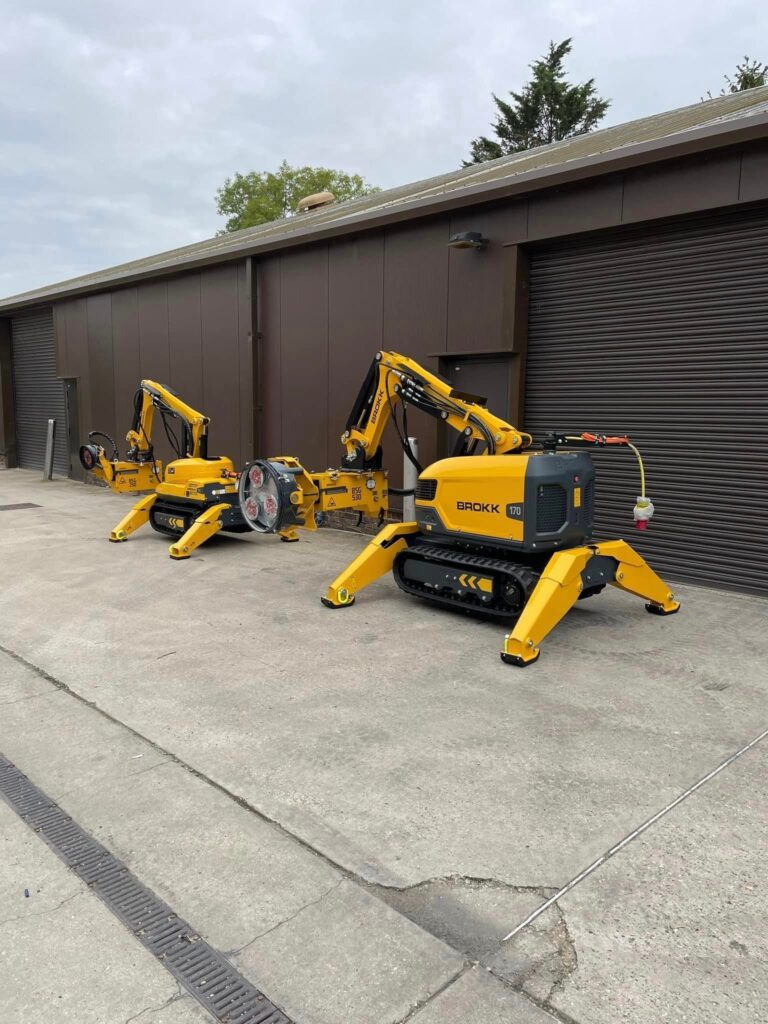
Cost-Effective Demolition Services in Halifax
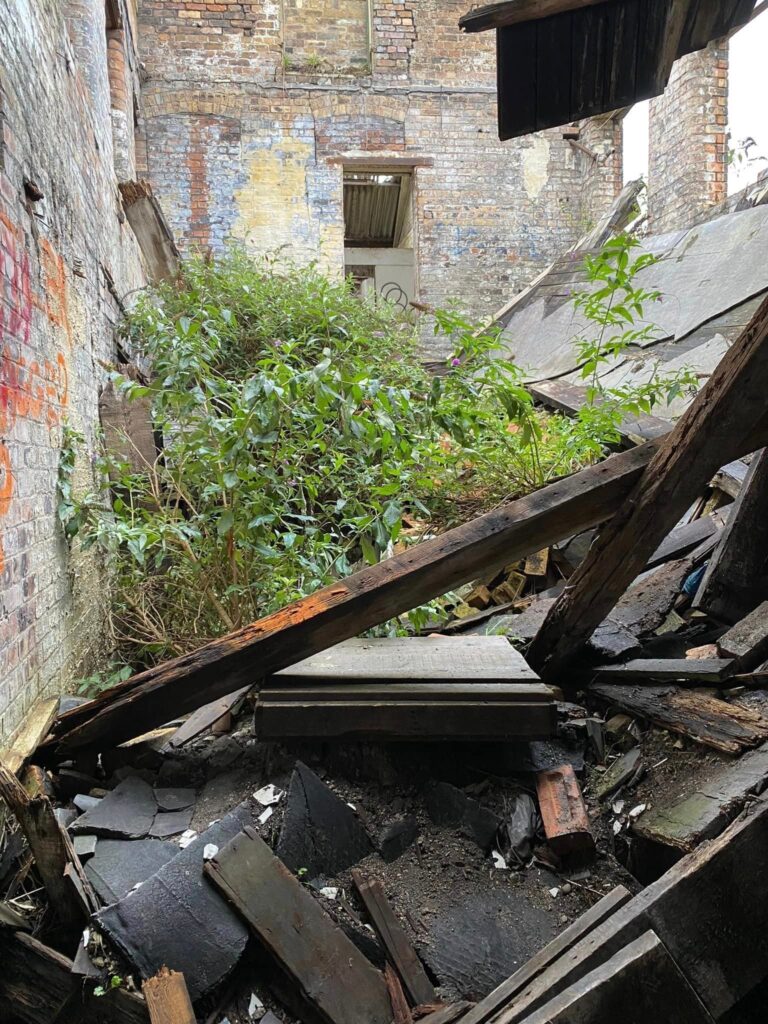
Complete Demolition Halifax: Your Partner in Professional Commercial Demolition
We have established our robust reputation with our clients and local communities by delivering the highest level of professional commercial demolition throughout Halifax.
We possess all the necessary demolition machinery and equipment required to execute any commercial demolition projects, from the demolition of single-story structures to multi-level office blocks.
Handling Complex Demolition Projects
A commercial demolition project can be a complicated process. It often involves working in densely populated environments and restricted work areas, alongside operating businesses and the public.
Complete Demolition Halifax is highly experienced in working efficiently and cohesively around other trades and residents, ensuring minimal disruption to your project time limit.
Our Experience in Halifax
With decades of experience in the demolition industry, we have successfully demolished various types of business properties in Halifax.
Our expertise extends to multi-storey high-rise buildings, apartment blocks, hospitals, shopping centers, factories, and warehouses. We are committed to providing top-notch demolition services that meet the unique needs of each project.
We take all necessary precautions and implement safety procedures to ensure that our demolition site staff, your employees, and other people around the site are safe throughout the demolition process. We have decades of experience demolishing:
- Business Properties demolished in Halifax
- Multi-Storey high-rise buildings demolished in Halifax
- Apartment blocks demolition in Halifax
- Hospitals
- Shopping centers
- Factories demolished in Halifax
- Wearhouse’s demolished in Halifax
Infrastructure Regeneration Contractor Halifax
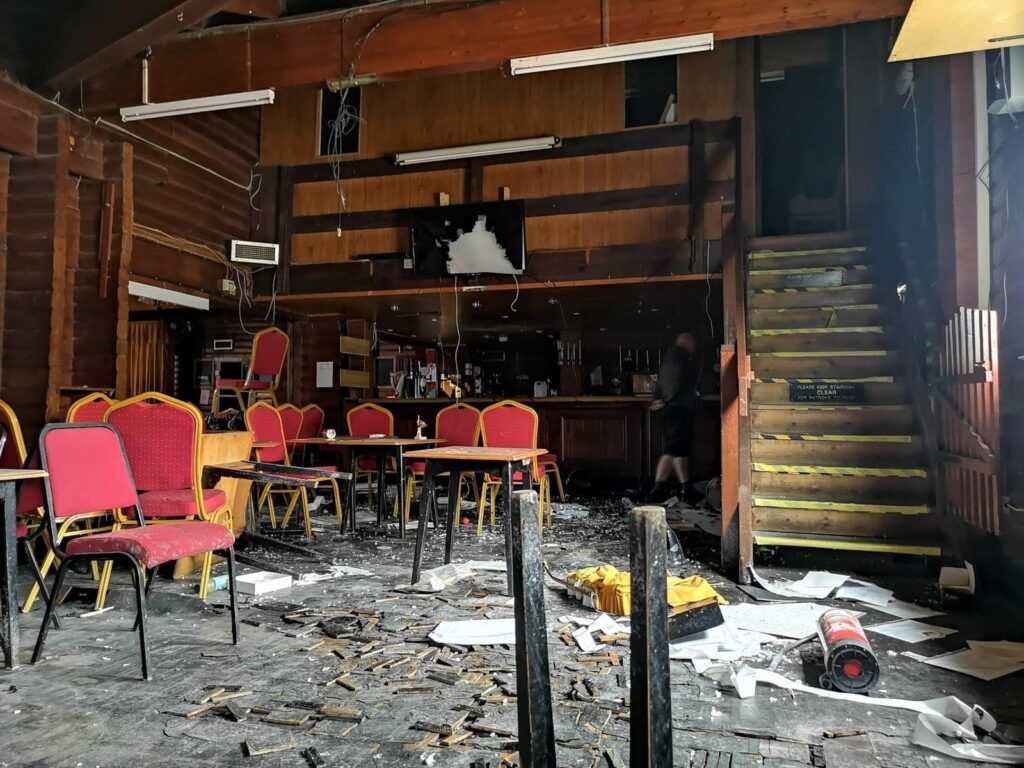
Emergency Demolition Services: Quick Response When You Need It Most
In instances where safety is jeopardized due to unforeseen circumstances, emergency demolition becomes essential.
Situations may arise unexpectedly, such as structural damage or dangerous conditions that necessitate immediate action.
Having a seasoned team of emergency demolition contractors in Halifax can significantly mitigate risks and ensure the safety of those involved.
Timely Action is Crucial
When faced with an urgent demolition need, every second counts. Delaying the demolition process can escalate hazards, leading to potential injuries or, in severe cases, fatalities.
Complete Demolition understands the urgency in such scenarios and is trained to respond swiftly. As soon as an emergency call is received, we mobilize our resources to reach your location promptly, ensuring that the situation is addressed without delay.
Safe and Coordinated Response
Upon arrival, our emergency demolition response team conducts a thorough assessment of the situation. This initial evaluation is critical in determining the appropriate course of action.
We prioritize site safety, implementing necessary precautions to secure the area. Our team works in collaboration with other emergency response units to tackle the challenges present, ensuring that all dangerous elements are dealt with efficiently.
In the event you find yourself in a hazardous construction scenario, remember that our dedicated emergency demolition services are here to assist you.
Reliable House Demolition Company in Halifax and Surrounding Areas
If you are looking for a stress-free way to have your house demolished in Halifax and surrounding areas, you have come to the right place.
As one of the most experienced and respected house demolition companies, we’re renowned for delivering cost-effective specialist residential house demolition services to homeowners.
Our Expertise in Residential Demolition
With years of experience in the industry, our team is well-versed in handling various types of residential demolitions. Whether you need a partial or complete house demolition, we ensure that the process is smooth and efficient.
Our experts are equipped with advanced tools and follow stringent safety measures to provide you with the best service possible.
Why Partner With Us?
Choosing the right demolition company can be a daunting task. Our commitment to excellence and customer satisfaction sets us apart. We offer:
- Comprehensive site assessments and consultations
- Environmentally responsible demolition practices
- Timely project completion
- Competitive pricing
We understand that every demolition project is unique, and we tailor our services to meet your specific needs.
Get Started Today
Ready to take the next step? Contact us today to learn more about our residential house demolition services in Halifax and surrounding areas. Our friendly and professional team is here to answer any questions and guide you through the process.
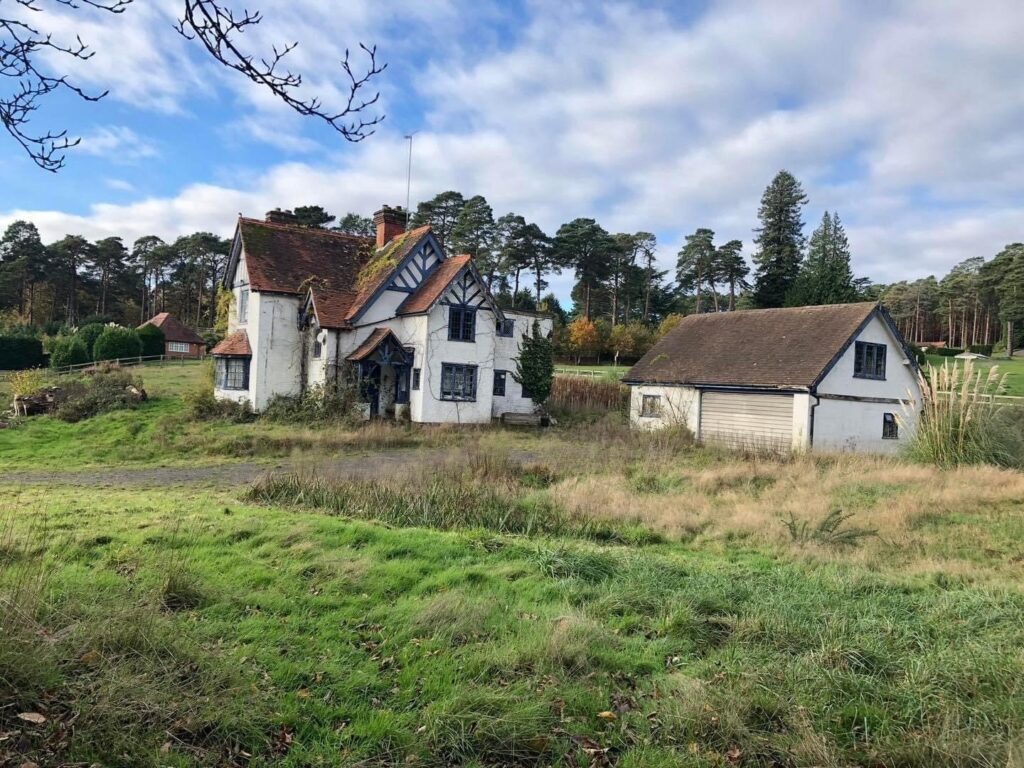
Total: Your Trusted Soft Strip Out Demolition Partner in Halifax
Complete Demolition is a prominent construction soft strip out demolition company based in Halifax. With our extensive experience and expertise, we have established ourselves as a trusted partner for a diverse range of clients.
Our team of highly skilled professionals specializes in soft strip demolition services, providing efficient and safe removal of non-structural elements within buildings.
Our Services
We take pride in our strong partnerships with a wide variety of clients. Our collaboration with local authorities allows us to contribute to the development and regeneration of local communities.
Property developers and house builders rely on our expertise to prepare buildings for new construction or renovation projects.
Hotels and restaurants often require soft strip demolition services to transform their spaces and create new experiences for their guests. Housing associations trust us to carry out the necessary strip-out work to provide safe and comfortable homes for residents.

FREQUENTLY ASKED QUESTIONS ABOUT OUR DEMOLITION SERVICES IN HALIFAX
Soft strip out demolition is a specialized construction process that involves the careful removal of non-structural elements from a building. This technique is widely utilized during renovation, refurbishment, or repurposing projects, allowing for a comprehensive reconfiguration of internal spaces without affecting the integrity of the structure itself. The main objective of soft strip out demolition is to clear out all types of fixtures, fittings, and non-essential materials, paving the way for new installations and design changes.
During a soft strip out, the types of materials typically removed include ceiling tiles, light fixtures, plumbing fixtures, carpets, partitions, washroom fittings, and any other non-load-bearing elements. The process emphasizes minimal disruption, ensuring that existing structural components, such as beams and walls, remain intact. This technique can be particularly advantageous in occupied spaces, as it creates minimal noise and dust compared to traditional demolition methods, making it suitable for residential and commercial environments alike.
Furthermore, soft strip out demolition promotes sustainability and efficiency within construction projects. By meticulously sorting and prioritizing materials, contractors can identify items that are salvageable, recyclable, or reusable, thereby contributing to waste reduction. In areas like Halifax, where environmental considerations are increasingly integrated into construction practices, soft strip outs provide significant benefits by facilitating more sustainable development techniques.
In addition, the advantages of soft strip out demolition extend to the economic realm. This process can lead to cost savings by minimizing disposal fees associated with waste removal and by providing the possibility of reusing materials on-site or in other projects. Ultimately, soft strip out demolition serves as a critical step in modern construction and renovation, ensuring that spaces are efficiently prepared for subsequent development endeavors.
The Importance of Soft Strip Out in Renovation Projects
Soft strip out demolition plays a decisive role in renovation projects by providing a structured approach to preparing spaces for new construction. This method allows for the removal of non-structural elements such as fixtures, fittings, and interior finishes, thereby creating a clean slate that facilitates effective space planning and design. By utilizing soft strip out techniques, contractors and designers can reap significant benefits, making it a fundamental aspect of renovation in Halifax and the surrounding areas.
One of the key advantages of soft strip out is its ability to enhance space efficiency. During the strip out process, items that are no longer functional or relevant can be carefully dismantled, thereby ensuring that the space can be reconfigured to meet modern needs. For instance, a recent renovation project in downtown Halifax involved the transformation of a historic building into a modern office space. The soft strip out allowed the removal of outdated partitions and fixtures, ultimately leading to an open-plan design that maximized natural light and created a more collaborative working environment.
Moreover, soft strip out can significantly contribute to sustainability goals. By facilitating the careful salvage and recycling of materials, such demolition practices align with eco-friendly initiatives. In one example, a residential property in Cole Harbour underwent a soft strip out where reusable materials were identified and donated to local charities. Such practices not only reduce waste but also foster a sense of community engagement.
In summary, the soft strip out demolition method is integral to successful renovation projects. By enabling efficient space reconfiguration and promoting sustainability, it lays the groundwork for innovative design solutions. Whether addressing commercial or residential renovations, this approach is an indispensable tool in the toolkit of modern construction and design professionals in Halifax and its neighboring regions.
Environmental Considerations and Waste Management
Soft strip out demolition refers to the methodical removal of non-structural interior components from a building, a process that necessitates careful consideration of environmental impact and waste management practices. Effective waste management is critical in soft strip out projects to minimize their ecological footprint, particularly in urban areas like Halifax. Contractors must adopt strategies that prioritize recycling, thereby reducing the volume of building materials that ultimately end up in landfills.
One key aspect of sustainable soft strip out demolition is the segregation of materials on site. By distinguishing between various types of waste—such as metals, wood, plastics, and concrete—contractors can enhance the recycling potential of the removed materials. This practice not only contributes to resource recovery but also ensures compliance with local waste regulations and promotes a culture of sustainability within the construction industry.
In Halifax and surrounding areas, establishing partnerships with local recycling facilities is paramount. These partnerships enable contractors to divert recyclable materials efficiently, helping to streamline the disposal process and reduce carbon emissions associated with transportation. Furthermore, utilizing these local facilities supports the regional economy, fostering a more resilient community committed to environmental stewardship.
Implementing environmentally friendly disposal methods is also essential in the process of soft strip out demolition. Conducting audits to identify hazardous materials—such as asbestos or lead—requires specialized training and appropriate disposal routes to prevent environmental contamination. Utilizing eco-conscious demolition techniques and adhering to best practices for safety and sustainability is not only a legal obligation but also an ethical responsibility that contractors must uphold.
In conclusion, prioritizing environmental considerations and effective waste management in soft strip out demolition is vital for sustainability efforts in Halifax and its vicinity. By adopting best practices and fostering collaborations within the local community, contractors can significantly mitigate their environmental impact while improving the overall efficiency of their operations.
Choosing the Right Contractor for Soft Strip Out in Halifax Areas
When embarking on a soft strip out demolition project in Halifax and its surroundings, selecting the right contractor is paramount to ensuring a successful outcome. The first critical factor to consider is the contractor’s experience in the field of soft strip out demolition. A knowledgeable contractor who has completed similar projects in Halifax, Aberford, Addingham, and other surrounding areas is likely to be well-acquainted with local regulations, environmental concerns, and best practices. An experienced contractor can provide valuable insights and help streamline the process from start to finish.
Licensing is another essential consideration. It is crucial to verify that the contractor holds all necessary local permits and licenses to perform demolition work in the Halifax areas. Proper licensing not only demonstrates compliance with local laws but also indicates a commitment to safety and professionalism. Furthermore, insurance coverage is critical; ensure that the contractor carries both liability insurance and worker’s compensation. This protects you from potential financial liabilities in case of accidents or property damage during the demolition process.
Customer reviews and testimonials serve as an excellent resource when assessing potential contractors. Explore online platforms, such as Google or Yelp, to gather feedback from previous clients regarding their experiences with various contractors. Pay special attention to comments about the contractor’s communication style, timeliness, and overall workmanship. Conducting interviews or consultations with potential candidates can also provide an opportunity to gauge their expertise and approach. Asking specific questions about their methods and familiarity with the unique demands of soft strip out projects in Halifax can further aid in your decision-making process.
By carefully evaluating these key factors, you can select a qualified contractor who aligns with your project needs, ensuring a smooth and efficient soft strip out demolition experience in Halifax and surrounding areas.
Introduction to Demolition Services
Demolition services play a crucial role in urban development and infrastructure reinforcement, particularly in areas such as Halifax and its neighboring regions. These specialized services encompass a variety of demolition work, ranging from residential demolitions of homes to large-scale commercial and industrial site clearances. Each demolition type serves unique purposes but ultimately contributes to the broader endeavor of creating space for new constructions and development projects.
Residential demolition services involve the systematic tearing down of homes or apartment buildings to make way for new residential structures. This process not only includes the demolition of the building itself but also entails the careful removal of hazardous materials, such as asbestos, to ensure safety and compliance with local regulations. Commercial demolition addresses larger facilities like office buildings, shopping centers, and warehouses. These projects are often more complex due to their scale and the presence of utilities, necessitating experienced contractors to manage the operation effectively.
Industrial demolitions focus on the systematic dismantling of plants, factories, and other large industrial complexes, which often require a robust understanding of the unique safety challenges they present. Regulatory requirements and safety standards are paramount in all types of demolition work. In Halifax, demolition companies must adhere to strict guidelines set forth by municipal and provincial regulatory bodies. These regulations aim to safeguard the environment and ensure public safety during the demolition process.
The significance of these services is not just limited to clearing space; they are integral to sustainable urban renewal initiatives. By collaborating with demolition contractors, communities can facilitate safe and efficient site preparation for new ventures that cater to the growing population and evolving societal needs. This lays the groundwork for an innovative approach to urban planning and development in Halifax and the surrounding areas.
Key Roles of Demolition Contractors in the Community
Demolition contractors play a pivotal role in the urban development landscape of communities such as Aberford, Adlingham, Baildon, and Batley. These companies are not merely responsible for tearing down structures; they facilitate extensive planning and coordination efforts with local entities and stakeholders. Their engagement with city officials ensures compliance with regulations, streamlining the demolition process and mitigating potential disruptions to the community.
One of the primary responsibilities of demolition contractors is to develop and adhere to strict schedules that align with project timelines and community needs. By collaborating closely with local clients, including businesses and homeowners, these contractors tailor their services to minimize inconveniences during demolition activities. This coordination ensures that while structural removal is conducted, the welfare of the surrounding community remains a priority.
Beyond logistical considerations, demolition companies in Halifax and its surrounding areas are increasingly recognized for their environmental stewardship. Effective waste management has become a cornerstone of their operations, as they navigate the complexities of safely removing materials from demolition sites. This process involves identifying reusable and recyclable materials, thereby significantly reducing landfill contributions and supporting sustainability initiatives within the local area.
As advocates for ecological responsibility, these contractors often implement innovative waste recycling programs. The materials salvaged from buildings—like metals, wood, and concrete—are either reused in new construction or processed for recycling. This commitment not only supports local economies but also fosters environmental sustainability, leading to a greener community. As urban renewal efforts continue to evolve, the integral role of demolition contractors in facilitating safe, efficient, and environmentally responsible practices has become increasingly pronounced, highlighting their importance in the region’s growth and development.
Challenges Faced by Demolition Companies
Demolition companies operating in Halifax and its surrounding areas, such as Birkenshaw, Boston Spa, and Brighouse, encounter a variety of challenges that can significantly impact their operations. One of the primary hurdles is navigating strict local regulations and compliance requirements. These regulations are often put in place to ensure safety, minimize environmental impact, and protect surrounding communities. As a result, demolition contractors must stay well-informed about the evolving legislative landscape and ensure that all necessary permits are obtained before commencing any project.
In addition to regulatory hurdles, demolition companies often face the challenge of dealing with hazardous materials. Many older structures may contain asbestos, lead, or other hazardous substances that require specialized handling and disposal processes. Consequently, contractors need to invest in the right training and equipment to manage these dangers safely. Failure to comply with proper procedures can pose significant health risks to workers and surrounding residents, as well as result in legal repercussions for the company.
Logistical management in densely populated regions presents another layer of complexity for demolition firms. Limited access to job sites, the presence of neighboring properties, and the need to ensure public safety require careful planning and execution. Demolition companies often have to coordinate with local authorities, utility providers, and other stakeholders to mitigate disruptions and ensure the safe progress of their work. This necessitates a thorough understanding of urban dynamics and advanced project management techniques.
Despite these challenges, technology has emerged as a critical ally for demolition companies. Modern advancements such as remote-controlled demolition equipment, advanced software for project planning, and sustainable waste management practices help enhance efficiency and safety. By adapting to these innovations, companies in the demolition sector are better equipped to navigate the challenges inherent in their operations while upholding high standards of professionalism and environmental responsibility.
The Future of Demolition in Halifax and Surrounding Areas
The demolition industry in Halifax and its surrounding areas is poised for significant evolution, driven by emerging technologies, environmental considerations, and dynamic urban development trends. One notable trend is the adoption of advanced demolition technologies, such as robotics and drones, which promise safer and more efficient demolition processes. These technologies allow teams to assess conditions from a distance, enhancing both safety and precision while reducing disruption to surrounding communities.
Moreover, the push toward green demolition practices is gaining momentum. Demolition companies are increasingly focusing on minimizing waste and prioritizing recycling and salvage of materials. Techniques such as deconstruction, which involves carefully dismantling structures instead of simply crushing them, facilitate the recovery of valuable resources. This approach contributes not only to waste reduction but also to the sustainable development goals set forth by local and national authorities. As concerns over environmental impacts grow, regulatory bodies are likely to impose stricter guidelines, prompting contractors to adopt greener methods as a standard practice.
In addition to technological advances and environmental initiatives, evolving planning policies are expected to shape the future landscape of demolition projects. As urbanization accelerates in Halifax and nearby regions like Calverley and Castleford, the demand for redevelopment of older infrastructure will rise. Demolition companies will be pivotal in facilitating these changes, enabling urban renewal that caters to the increasing population. Demographic shifts, including population growth and changes in housing needs, will create further opportunities for contractors to engage in projects that not only benefit local economies but also enhance livability.
As Halifax and its neighboring areas continue to adapt to these changes, it is clear that the future of the demolition industry will be marked by innovation, sustainability, and a commitment to meeting the evolving needs of modern society. Demolition companies and contractors will need to remain agile and responsive to these trends to thrive in a competitive landscape.
Commercial Demolition Contractors Halifax
Complete Demolition has solidified its reputation as a leading commercial demolition contractor through extensive experience and a steadfast commitment to excellence.
Confined Spaces Demolition
Complete Demolition’s expertise in confined robotic demolition extends across various industries, making it a versatile and reliable partner for numerous sectors. In the construction industry
Crushing & Screening Contractors Halifax
Complete Demolition provides a wide array of comprehensive services, specialising in crushing, screening, and demolition. Our capabilities span from small-scale residential demolitions
High-Rise Demolition Contractors Halifax
Complete Demolition has firmly positioned itself at the forefront of high reach demolition services, a niche that demands unparalleled precision and expertise.
Asbestos Removal Contractors Halifax
With years of experience in the industry, our team of experts has the knowledge and skills to handle all types of asbestos removal projects. We stay up-to-date with the latest industry regulations and best practices.
House Demolition Halifax
Complete Demolition offers expert house demolition services with a focus on safety and efficiency. Our skilled team follows stringent safety protocols, manages hazardous materials like asbestos
Chimney Demolition Contractors Halifax
Complete Demolition takes pride in its team of highly skilled professionals who possess extensive experience in commercial chimney demolition. Our expertise spans across projects of various sizes
Facade Retention
Complete Demolition stands out as a leader in the field of facade retention and preservation. With years of experience and a portfolio of successful projects, they have earned a reputation for excellence.
Bridge Demolition Contractor Halifax
Complete Demolition has carved out a reputation as a leading authority in bridge demolition services. With a history spanning numerous years in the industry, the company possesses a wealth of knowledge
Decommissioning Contractor Halifax
Complete Demolition has established itself as a leading specialist in the field of building and asset decommissioning. With years of extensive experience, the company has managed a wide array
Building Soft Strip Out Contractor Halifax
Complete Demolition stands at the forefront of the demolition industry, renowned for its excellence in providing comprehensive soft strip out demolition services. With a wealth of experience
Emergency Demolition
Complete Demolition has established itself as a reputable provider of emergency demolition services in the United Kingdom. Renowned for its swift and efficient responses.
Industrial Demolition Contractor Halifax
Complete Demolition excels in delivering cost-effective industrial demolition projects without compromising on quality or safety. One of the key strategies employed is efficient resource
Hazardous Materials
Accurate identification is paramount in hazardous waste management, as it ensures that each type of waste is handled according to its specific requirements.
Dismantling Contractors Halifax
Complete Demolition stands out among engineering contractors by offering a suite of innovative and cost-effective demolition solutions. The company integrates advanced
Partial Demolition
Complete Demolition Services, a leading provider of full and partial demolition solutions in the UK, is renowned for its commitment to excellence, safety, and environmental stewardship.
Additional services that we offer that may interest you
TOTAL Groundworks & Civils
Total Group has a strong track record in the design and construction of a wide range of Civil Engineering and Infrastructure projects, ranging from minor road improvements to major infrastructure schemes.
TOTAL Construction
At Total Group, we specialise in a wide range of construction services, including refurbishments, fit outs, complex construction projects, and interior design. Our team of skilled professionals is dedicated to delivering high-quality results
TOTAL Tarmac Surfacing
We specialise in providing top-quality tarmac surfacing and paving services throughout the UK. Our team of skilled professionals is dedicated to delivering exceptional results, ensuring that every project is completed to the highest standards
TOTAL Brownfield Remediation
Total Group have accumulated extensive experience contaminated brownfield land remediation contractor operating throughout the United Kingdom. We deliver an extensive range of brownfield remediation solutions.
Ready to start your project?
Committed to Excellence on all levels
Let's Work Together
To get started, for general enquiries simply complete the form below. Provide us with your project details, and our team will review your requirements. We will then get back to you with a customised solution that fits your needs. Whether you have a small-scale project or a large-scale development, we have the expertise and resources to handle it. Once we have received your submission, you will receive a confirmation email (Please check all your email boxes)
If you prefer, and have a project in mind and seeking a price you can also send us your project documents and any photographs directly to Price@completedemolition.co.uk We will carefully examine your documents and provide you with a competitive quote together with a timescale from inception through to completion for your project.


